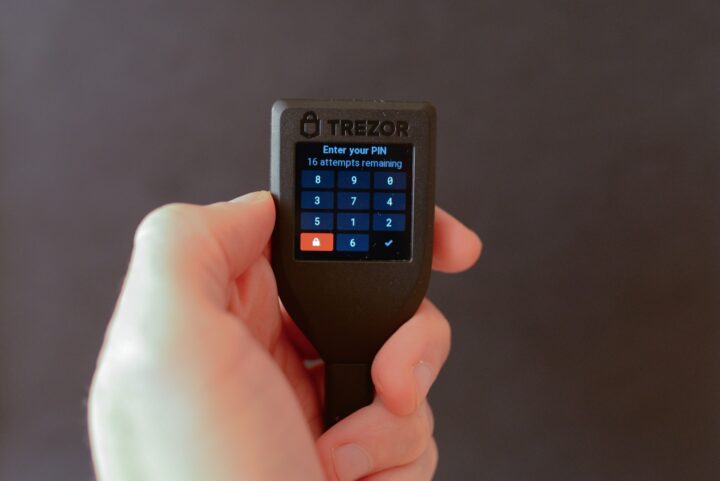In the world of cryptocurrency, securing your digital assets is essential. The Trezor Wallet is one such device that has gained a reputation for its high level of security and ease of use. In this guide, we will take a closer look at Trezor Wallets, exploring the basics of hardware wallets, their features and advantages, and how they can protect your cryptocurrency investments. Whether you’re a seasoned cryptocurrency investor or just getting started, this guide will help you understand the fundamentals of Trezor Wallets and how they can help you keep your digital assets safe.
What is Hardware Wallet
Hardware wallets are physical devices that store cryptocurrency in offline or “cold” storage, meaning that they are not connected to the internet. These devices typically resemble a USB stick and function as simplified, single-purpose computers. By using a hardware wallet, cryptocurrency transactions are digitally signed within the device using your private key and then securely uploaded to the blockchain through a crypto bridge. Hardware wallets can be purchased for as little as $30, but may cost up to $100. They offer users complete control over their digital assets, but may be less convenient than mobile or “hot wallets” in some situations.
What is Trezor Wallet
A particular style of hardware wallet called the Trezor Wallet was developed to offer safe cryptocurrency management and storage. Your secret keys and digital assets are kept offline by this physical device, making it very resistant to internet attacks and hacker attempts. The Trezor Wallet is a well-liked option among bitcoin investors because of its high degree of security and user-friendly features. It supports a number of cryptocurrencies, including Bitcoin, Ethereum, and Litecoin, and it may be used on a desktop computer or mobile device to organize and carry out transactions. For individuals who place a high priority on security and wish to shield their bitcoin assets from any security breaches, Trezor Wallet is a dependable option.
Advantages of Trezor Wallet
The Trezor Wallet offers several advantages over other types of cryptocurrency wallets:
Enhanced Security
Trezor Wallet adds an extra degree of protection against hacking and other online dangers by keeping private keys and digital assets offline.
User-Friendly Interface
Even beginners can manage their crypto assets with ease because of the user-friendly interface of the Trezor Wallet.
Compatibility
The wallet is a flexible tool for managing multiple digital assets because it supports a number of cryptocurrencies, including Bitcoin, Ethereum, Litecoin, and others.
Accessibility
Both desktop PCs and mobile devices may be used to access your digital assets with Trezor Wallet, giving you access to them from any location.
Multifactor Authentication
Multifactor authentication is supported by the wallet, which gives the login procedure an additional degree of protection.
Recovery Options
In case of loss or damage to the device, Trezor Wallet provides several recovery options to ensure that your digital assets are not lost.
Disadvantages of Trezor Wallet
Even if the Trezor Wallet is a well-known and recognized hardware wallet, there are a few possible drawbacks to take into account:
Cost
The Trezor Wallet is relatively pricey when compared to other kinds of crypto wallets; costs vary from $70 to $200 depending on the model.
Limited Availability
As the Trezor Wallet is a physical item, there can be delivery delays or availability concerns. It might also not be instantly available for purchase.
Physical Security
It is crucial to store the Trezor Wallet in a secure area since, although providing improved protection for your digital assets, it is still susceptible to physical theft or loss.
Recovery Process
Although the Trezor Wallet provides recovery alternatives in the event of loss or damage, the procedure can be challenging and may call for technical knowledge.
List of Cryptocurrencies Supported by Trezor Wallet
The Trezor Wallet supports a wide range of cryptocurrencies, including:
- Bitcoin (BTC)
- Bitcoin Cash (BCH)
- Litecoin (LTC)
- Ethereum (ETH)
- Ethereum Classic (ETC)
- Dash (DASH)
- Zcash (ZEC)
- NEM (XEM)
- Dogecoin (DOGE)
- Stellar (XLM)
- Ripple (XRP)
- Bitcoin Gold (BTG)
- EOS (EOS)
- Tezos (XTZ)
- Cardano (ADA)
- Tron (TRX)
- Monero (XMR)
- Lisk (LSK)
- Bitcoin Private (BTCP)
- DigiByte (DGB)
This is not a comprehensive list, and Trezor keeps adding support for new cryptocurrencies as they become accessible.
Where to Buy Trezor Wallet
Direct purchases of the Trezor Wallet may be made via trezor.io, the company’s website. The Trezor One, Trezor Model T, and Trezor Suite are just a few of the several types they provide. Depending on where you are, the website offers payments through credit cards, PayPal, Bitcoin, and other payment options.
The Trezor Wallet may be purchased through a variety of authorized shops and resellers, both online and in physical places, in addition to the manufacturer’s website. They include well-known online merchants like Amazon, Newegg, and Best Buy in addition to nearby bitcoin businesses and specialized electronics shops.
